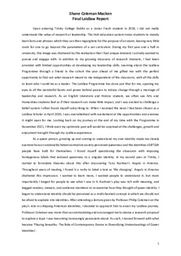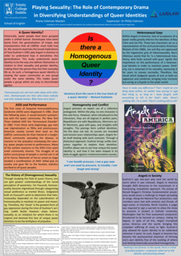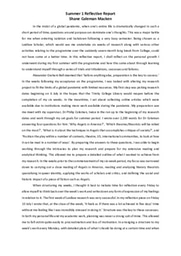Research Proposal: 'Playing Sexuality: The Role of Contemporary Drama in Diversifying Understandings of Queer Identities'
In literary canons and historiography, queer identity and the nature of homosexuality have been written as a unified, homogeneous identity. As a group, the LGBTQ+ community are combined to be represented as one cohesive group with little elements of diversity or variation. In undergraduate level English literature, students are rarely given the distinct opportunity to focus on the portrayal and function of queer characters and the queer identity within the literary world. This project aims to understand the nature of literary portrayals of LGBTQ+ members of society by examining how Tony Kushner’s 1991 play Angels in America defies social norms and previous literary tropes in relation to the gay community. In order to this, research will be drawn from leading gender and queer theorists’ works, including Judith Butler’s ‘Performative Acts and Gender Constitution’ and Michel Foucault’s History of Sexuality, to underline the theoretical understandings of deviation from a heterosexual norm.
The eruption of the AIDS Crisis in the 1980s saw the vilification of gay men due to their perceived role in spreading society’s latest plague. The crisis led to Kushner’s Angels in America becoming a quintessential depiction of the performative role of sexuality in the modern literary world, as this project will outline. Kushner once said that ‘America watching the spectacle of itself being able to accept homosexuality is good for America’, a role that many critics and scholars focusing on this play have neglected. Most of the work surrounding Angels in America follows the intensely political nature of the play and its criticisms of the United States under the Reagan era. Yet, my project will look to the social function of Angels as a drama. When someone lies outside of the cisgender binary or desires a member of their own sex, they are expected to ‘come out’. The act of coming out moves towards the assumption that sexuality is an active performance of a person’s beliefs and persuasions to society. As a play, Angels in America seeks actors to dramatize the characters’ roles within society. Their identity becomes a performance piece. This project would focus on Kushner’s implementation of a dialectical, oppositional, approach to later twentieth century queer identity. Kushner makes no attempt to write his gay characters as a group united in their struggle against a repressive America, but more so a warring faction of a minority seeking their own voices in a society that groups gay men as one body. I want to seek out the ramifications this has on the society that it represents and the lasting implications the diversifying nature of Kushner’s play has on contemporary understandings of the queer identity evolving into queer identities.
Through my engagement in the historiography of sexuality, I shall develop a sense of society’s perception of what it meant to be gay and the reaction to deviating from heteronormative roles. Angels in America was a recipient of a Pulitzer Prize and Tony Award, and during a time of rampant homophobia, critical acclaim for a play detailing the resilience of the gay community in the face of overwhelming adversity (national and internal homophobia, along with growing numbers of fatalities in the face of the AIDS Crisis) constitutes a social re-evaluation of queer people in American life. Judith Butler wrote that seeing a performance of an act in the theatre could be written off by the viewing public as “just a play” and therefore deemed acceptable, whereas witnessing that same act on a bus or on the street undermines the imaginary quality it once had on the stage. This project will work to piece together the literary world with historiography and theory to underline the role a play such as Angels has in redefining the position of queer people in society.
My first research period will involve a textual analysis of Tony Kushner’s Angels and thorough reading of its criticisms. My research will go beyond the realm of literary criticism to examine its initial reception and the array of adaptations it has inspired. By studying the work of writers such as Foucault and Butler, I hope to garner an in-depth understanding of a philosophical approach to what it means to be queer and why society reacts to this in such a way. I intend to apply this theoretical and historiographical work to Angels in America, along with Jacques Derrida’s Deconstruction, to uncover the binary oppositions Kushner expertly writes. By the end of this five-week period, I will strive to recognise the play’s formal approach to destabilising the homogenous queer identity and its response to scholarly attempts to write queer peoples under one banner.
Through engaging with the array of ideologies behind Kushner’s work, my research endeavours to show that queer people cannot be understood as one cognate grouping by society. It will convey the importance of sexuality being acted upon stage, and how this informs the social function of acting out sexuality. As a Laidlaw scholar, I will highlight how Kushner seeks to redefine a society which actively hates queer people through a ground-breaking mix of magic and realism, and how his work has had a lingering echo in shaping social perceptions and acceptance of a marginalised community.



Please sign in
If you are a registered user on Laidlaw Scholars Network, please sign in
So fascinating, Shane, thank you for sharing!! Embarrassed to admit that I've never heard of Angels in America before reading this, but it is going straight onto my to-read list!
I'm so happy you enjoyed Nikol! I cannot stress enough how beautiful the play is. If you're interested, there's a HBO TV adaptation starring Meryl Streep and Al Pacione as well. It is a great binge and very close to the source material!